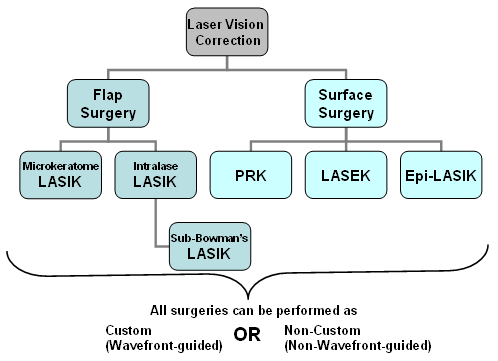Frequently Asked Questions Regarding Lasik Eye Surgical Procedure

Posted by-Burt Bentzen
Before LASIK, your eye specialist will test your vision to ensure it is stable. He or she will likewise examine to see if you have any other eye issues that could influence your outcomes.
After the ophthalmologist has applied numbing eye declines, he or she will develop a paper-thin flap in your cornea tissue making use of a device called a microkeratome or laser. http://rodrick00laverne.xtgem.com/__xt_blog/__xtblog_entry/__xtblog_entry/34393159-shocking-benefits-of-lasik-eye-surgical-treatment?__xtblog_block_id=1#xt_blog is painless.
What Is LASIK?
LASIK is a sort of refractive surgery. It deals with vision issues caused by refractive mistakes, which take place when the cornea or lens do not appropriately bend light rays.
Lots of people who have LASIK attain good distance vision without glasses or calls. Nonetheless, they might require reading glasses to see close up. The results of LASIK are permanent, although visual negative effects are short-term.
Can I Have LASIK if I Have Astigmatism?
Fuzzy vision is usually triggered by astigmatism. LASIK can aid with this issue by making your cornea a lot more balanced. The specialist will certainly make use of a tool called a microkeratome or laser to reduce a thin flap in your cornea, then fold it back. They will after that use a laser to improve the cornea so it can flex light better.
The only thing that LASIK can not do is correct presbyopia (age-related farsightedness). This can just be made with cataract surgery.
Can I Have LASIK if I Have Dry Eye?
An essential part of the LASIK examination is examining exactly how well your eyes create splits. Some people with dry eye are not able to obtain LASIK due to the fact that it can get worse the problem.
Dry eye is an usual negative effects of LASIK since the treatment cuts corneal nerves. However, it generally improves as the eye heals. You can use synthetic tears as well as punctal plugs to manage your signs and symptoms.
Can I Have LASIK if I Have a Cataract?
For the most part, yes. LASIK can enhance your vision after cataract surgical treatment.
When you have a cataract, your lens is over cast as well as your close-up vision is fuzzy. Suggested Internet site can aid with this, as well as your distance vision.
During LASIK, your doctor will utilize a laser or a blade to create a thin flap on your cornea. After that the doctor will fold up the flap back and also utilize a laser to improve your cornea.
Can I Have LASIK if I Have a Retinal Detachment?
Retinal detachment usually arises from a retinal tear. The doctor will certainly repair the tear with an in-office procedure called pneumatic retinopexy. After the eye is numbed, the physician inserts an expandable gas bubble into the eye to press the removed retina against its assistance tissue.
LASIK does not appropriate presbyopia, which establishes as you age and also causes blurred close-up vision. However, it can be integrated with mono-vision to decrease or get rid of the requirement for reviewing glasses.
Can I Have LASIK if I Have a Hyperopia (Farsightedness) or Nearsightedness (Nearsightedness)?
The majority of medical insurance companies don't cover LASIK due to the fact that it isn't taken into consideration medically necessary. However, they might repay clients for lens implants if a doctor is part of their network.
Before you go through LASIK, your eye doctor will execute an extensive eye test. This will consist of examining your total eye health and wellness, pupil size as well as refractive error. He or she will also measure the thickness of your corneas.
Can I Have LASIK if I Have Presbyopia (Aging Eyes)?
LASIK does not attend to presbyopia (loss of close to vision associated with age). Instead, it remedies refractive errors by improving the cornea.
After numbing decreases and also covering the eye with a guard or patch, the surgeon creates the flap. After that the laser reshapes the cornea. You might hear a clicking audio and scent an unusual scent. This is regular and also does not trigger harm.
Can I Have LASIK if I Have Keratoconus (Rounded Cornea)?
In LASIK, your cosmetic surgeon will utilize a femtosecond laser to cut a slim flap in the cornea. They will then fold it back as well as utilize a various laser to reshape your cornea.
Your vision is based upon exactly how light enters your eye, flexes via the lens as well as focuses on the retina. Refractive errors maintain light from concentrating appropriately as well as trigger blurred vision.
Can I Have LASIK if I Have Blepharitis (Inflammation of the Eyelids)?
A lot of people pick LASIK due to the fact that they desire freedom from glasses or contact lenses. It is necessary to discuss your objectives with your ophthalmologist prior to having the procedure.
LASIK is not unpleasant. Eye declines are placed to numb your eyes prior to the surgical procedure. http://beata38loren.xtgem.com/__xt_blog/__xtblog_entry/__xtblog_entry/34392949-the-benefits-of-lasik-eye-surgery-a-comprehensive-overview?__xtblog_block_id=1#xt_blog of patients describe really feeling a slight pressure but no discomfort. Recuperation from LASIK is fairly quick. Your vision will certainly be a little blurry and also light sensitive right after surgical treatment however must boost promptly.
Can I Have LASIK if I Have a Corneal Thickness Concern?
LASIK corrects vision by improving the corneal tissue. To do this, the cornea should be thick sufficient for the cosmetic surgeon to produce a flap.
If your corneas are also thin, you may be a candidate for laser vision correction procedures that do not need developing a flap, such as PRK or Epi-LASIK. These procedures have comparable outcomes to LASIK yet operate in a different method.

